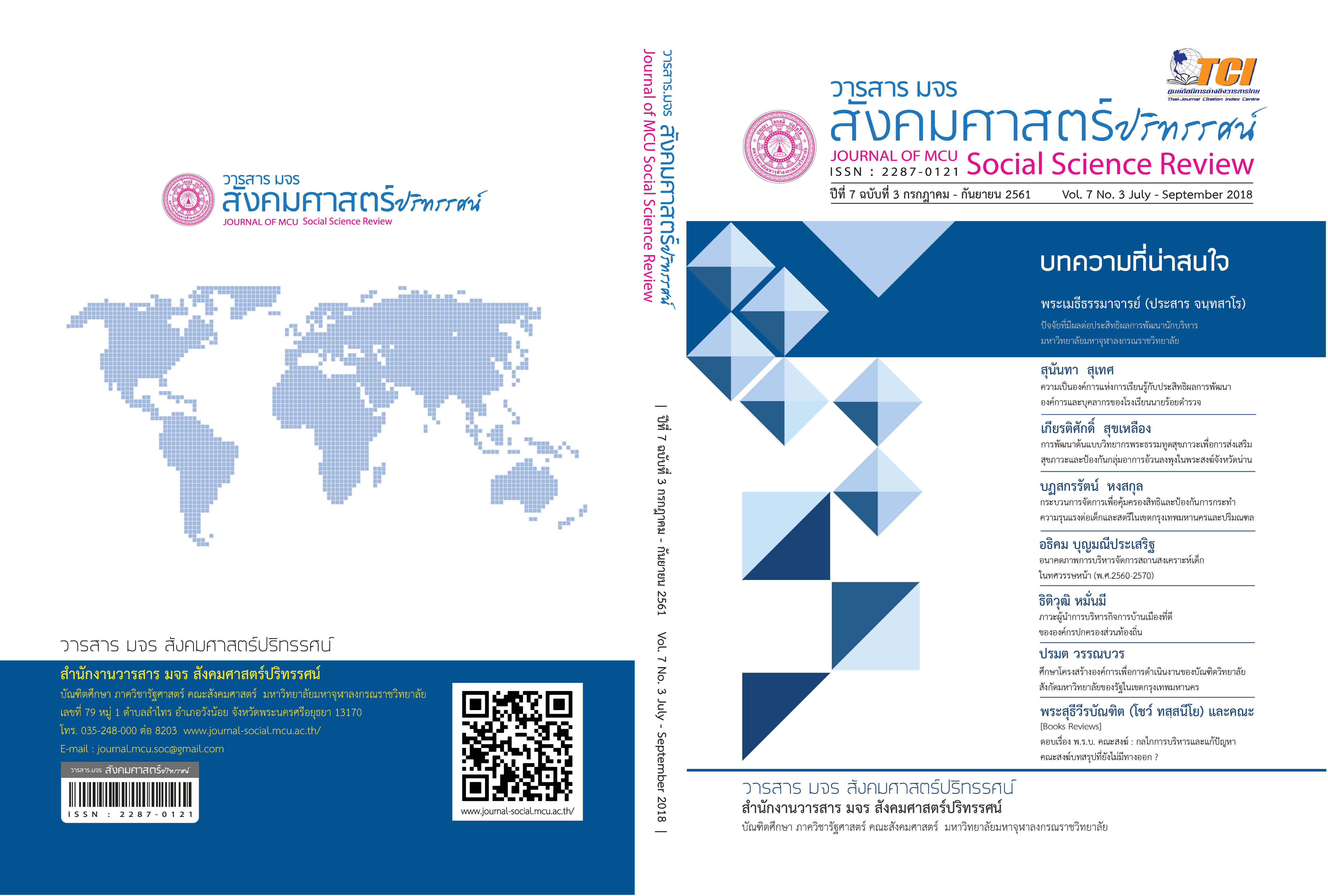รูปแบบการจัดการเรียนรู้ ที่ส่งเสริมทักษะทางปัญญา ในการคิดวิเคราะห์ ด้วยหลักพุทธธรรม ของนิสิตหลักสูตรพุทธศาสตรบัณฑิต มหาวิทยาลัยมหาจุฬาลงกรณราชวิทยาลัย
คำสำคัญ:
การจัดการเรียนรู้, หลักพุทธธรรม, ทักษะทางปัญญา, การคิดวิเคราะห์บทคัดย่อ
บทความวิจัยครั้งนี้มีวัตถุประสงค์ 1) เพื่อสร้างรูปแบบการจัดการเรียนรู้ที่ส่งเสริมทักษะ
ทางปัญญาในการคิดวิเคราะห์ ด้วยหลักพุทธธรรม 2) เพื่อประเมินความเป็นไปได้ในการนารูปแบบ
การจัดการเรียนรู้ที่ส่งเสริมทักษะทางปัญญาในการคิดวิเคราะห์ด้วยหลักพุทธธรรม ไปใช้จัดการ
เรียนรู้ 3) เพื่อเสนอแนวทางในการนารูปแบบการจัดการเรียนรู้ที่ส่งเสริมทักษะทางปัญญาในการคิด
วิเคราะห์ ด้วยหลักพุทธธรรม ไปใช้ในการจัดการเรียนรู้ ระเบียบวิธีวิจัยเป็นการวิจัยเชิงคุณภาพ
โดยการศึกษาจากเอกสาร สัมภาษณ์เชิงลึกผู้ทรงคุณวุฒิจานวน 7 รูป/คน สนทนากลุ่มเฉพาะครั้งที่
1 จานวน 14 รูป/คนเพื่อสร้างรูปแบบ สารวจความคิดเห็นของผู้สอน จานวน 269 รูป/คน และ
สนทนากลุ่มครั้งที่ 2 จานวน 15 รูป/คน เพื่อยืนยันรูปแบบและจัดทาข้อเสนอแนะ การวิเคราะห์
ข้อมูลด้วยการวิเคราะห์เนื้อหา สถิติที่ใช้ในการวิเคราะห์ข้อมูลโดยสถิติพรรณนา วิเคราะห์
องค์ประกอบเชิงยืนยันรูปแบบให้กลมกลืนกับข้อมูลเชิงประจักษ์
ผลการวิจัยพบว่า
1. รูปแบบการจัดการเรียนรู้ที่ส่งเสริมทักษะทางปัญญาในการคิดวิเคราะห์ด้วยหลักพุทธ
ธรรมของนิสิตหลักสูตรพุทธศาสตรบัณฑิต มหาวิทยาลัยมหาจุฬาลงกรณราชวิทยาลัย ที่ผู้วิจัย
พัฒนาขึ้นประกอบด้วย 2 องค์ประกอบหลักคือ 1. กระบวนการจัดการเรียนรู้ ประกอบด้วย
องค์ประกอบย่อย 6 ประกอบ ได้แก่ (1) กิจกรรมการเรียนรู้ (2) สื่อ นวัตกรรมและแหล่งเรียนรู้
(3) สิ่งสนับสนุนการเรียนรู้ (4) บทบาทผู้สอน (5) บทบาทผู้เรียน (6) การวัดและประเมินผล
2. ทักษะทางปัญญาในการคิดวิเคราะห์ ใน 3 ลักษณะ คือ (2) การวิเคราะห์เนื้อหา
(2) การวิเคราะห์ความสัมพันธ์ (3) การวิเคราะห์หลักการ
2. ผลการประเมินความเป็นไปได้ในการนารูปแบบการการจัดการเรียนรู้ที่ส่งเสริมทักษะ
ทางปัญญาในการคิดวิเคราะห์ ด้วยหลักพุทธธรรม ที่ผู้วิจัยสร้างขึ้นจากกระบวนการวิจัยเชิงคุณภาพ
โดยการตรวจสอบความเที่ยงตรงเชิงโครงสร้าง มีความสอดคล้องกับข้อมูลเชิงประจักษ์
ประกอบด้วย 1) กระบวนการจัดการเรียนรู้ที่ส่งเสริมทักษะทางปัญญาในการคิดวิเคราะห์ด้วยหลัก
พุทธธรรม 6 องค์ประกอบ 2) ทักษะทางปัญญาในการคิดวิเคราะห์ 3 องค์ประกอบ 3) แบบจาลอง
รูปแบบการจัดการเรียนรู้ที่ส่งเสริมทักษะทางปัญญาในการคิดวิเคราะห์ด้วยหลักพุทธธรรม เมื่อ
ดาเนินการปรับปรุงแล้ว มีค่าสัมประสิทธิ์อิทธิพล เท่ากับ 0.912 แสดงให้เห็นว่ารูปแบบที่พัฒนาขึ้น
สามารถนาไปใช้ได้จริง
3. ผลการประเมินและให้ข้อเสนอแนะรูปแบบการจัดการเรียนรู้ที่ส่งเสริมทักษะทาง
ปัญญาในการคิดวิเคราะห์ด้วยหลักพุทธธรรมของหลักสูตรพุทธศาสตรบัณฑิต มหาวิทยาลัยมหา
จุฬาลงกรณราชวิทยาลัย 2 ประเด็น คือ 1. ควรบูรณาการหลักพุทธธรรมเข้าในองค์ประกอบ
รูปแบบให้ชัดเจน พร้อมแสดงขั้นตอนการนาหลักพุทธธรรมไปใช้ในกระบวนการจัดการเรียนรู้
2.องค์ประกอบของรูปแบบควรเชื่อมโยงกับกิจกรรมในหน่วยการเรียนรู้ โดยเฉพาะหลักพุทธธรรมที่
จะช่วยปรับพฤติกรรมผู้เรียนให้สะท้อนคุณลักษณะของบัณฑิต
ดาวน์โหลด
เผยแพร่แล้ว
รูปแบบการอ้างอิง
ฉบับ
ประเภทบทความ
สัญญาอนุญาต
ลิขสิทธิ์ (c) 2018 วารสาร มจร สังคมศาสตร์ปริทรรศน์

อนุญาตภายใต้เงื่อนไข Creative Commons Attribution-NonCommercial-NoDerivatives 4.0 International License.
เพื่อให้เป็นไปตามกฎหมายลิขสิทธิ์ ผู้นิพนธ์ทุกท่านต้องลงลายมือชื่อในแบบฟอร์มใบมอบลิขสิทธิ์บทความให้แก่วารสารฯ พร้อมกับบทความต้นฉบับที่ได้แก้ไขครั้งสุดท้าย นอกจากนี้ ผู้นิพนธ์ทุกท่านต้องยืนยันว่าบทความต้นฉบับที่ส่งมาตีพิมพ์นั้น ได้ส่งมาตีพิมพ์เฉพาะในวารสาร มจร สังคมศาสตร์ปริทรรศน์ เพียงแห่งเดียวเท่านั้น หากมีการใช้ภาพหรือตารางหรือเนื้อหาอื่นๆ ของผู้นิพนธ์อื่นที่ปรากฏในสิ่งตีพิมพ์อื่นมาแล้ว ผู้นิพนธ์ต้องขออนุญาตเจ้าของลิขสิทธิ์ก่อน พร้อมทั้งแสดงหนังสือที่ได้รับการยินยอมต่อบรรณาธิการ ก่อนที่บทความจะได้รับการตีพิมพ์ หากไม่เป็นไปตามข้อกำหนดเบื้องต้น ทางวารสารจะถอดบทความของท่านออกโดยไม่มีข้อยกเว้นใดๆ ทั้งสิ้น





